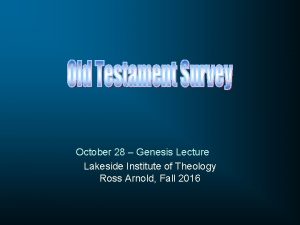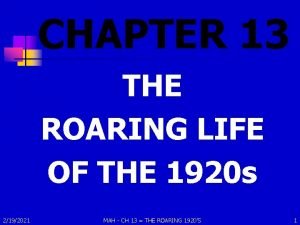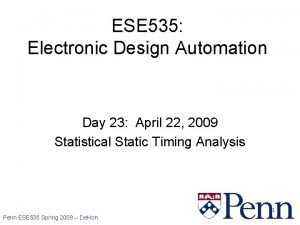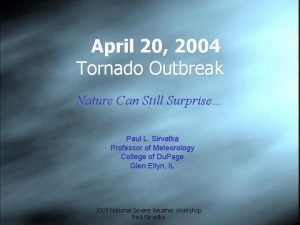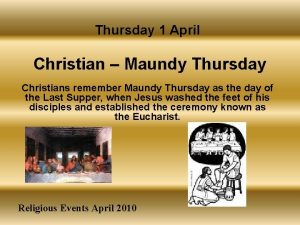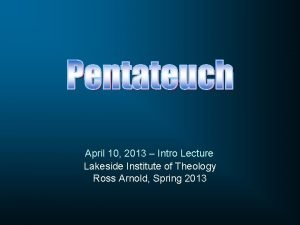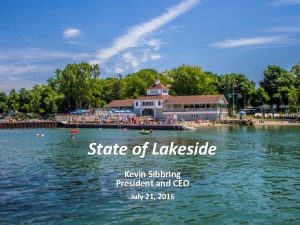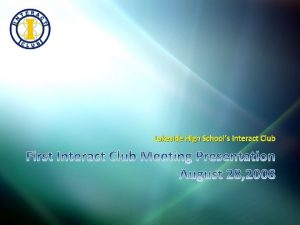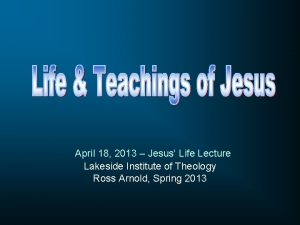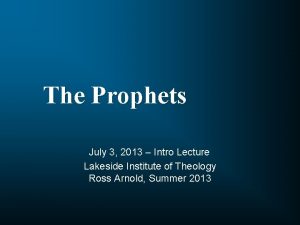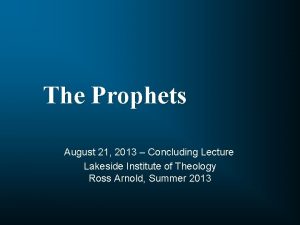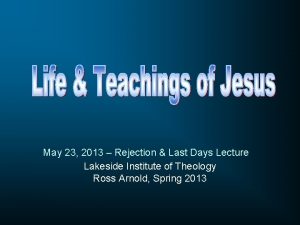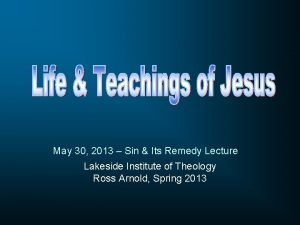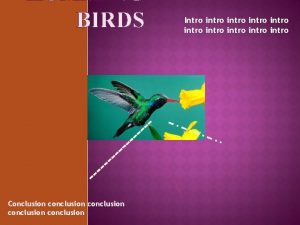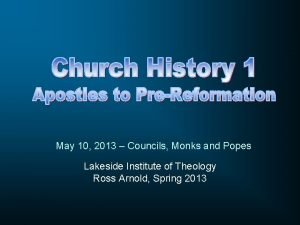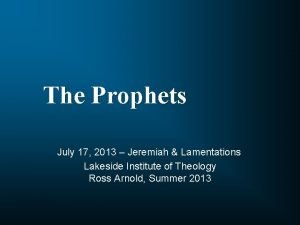April 11 2013 Intro Lecture Lakeside Institute of
















- Slides: 16

April 11, 2013 – Intro Lecture Lakeside Institute of Theology Ross Arnold, Spring 2013

Policies and Requirements 1. Classes are free, but all students seeking a certificate or degree must purchase books (paper, not electronic), which will be made available by the Institute. 2. Students in certificate or degree tracks may miss no more than one class per course, without arrangements made in advance with the teacher to make up missed work (at the discretion of the teacher). 3. Students in certificate or degree tracks will be required to take a pass/fail final exam in each course, based on study guidelines provided by the teacher. 4. Students in certificate or degree tracks must make a passing grade (based on "pass/fail") in each course in order to receive credit towards a certificate or degree. 5. Candidates for degrees (Master of Theology and Master of Theology & Ministry) must be approved by the Institute Director before final admission into a degree program.

Life & Teachings of Jesus (NT 3) 1. 2. 3. 4. 5. 6. 7. 8. Introduction to Life & Teachings of Jesus A Harmony of the Life of Jesus in the Synoptic Gospels Jesus in John’s Gospel The Gospel of the Kingdom of God The Ministries of Jesus Relationships: Jesus, Father, Followers Sin & Its Remedy; Final Exam

The Significance of Jesus is by far the best known person in history. He lived 2000 years ago, before mass communication or mass transportation, yet people still talk about him. He was a poor carpenter and itinerate teacher, but more plays, novels, nonfiction books, movies, articles, essays and sermons have been written about him than any other person in history. Therefore God exalted him to the highest place and gave him the name that is above every name, 10 that at the name of Jesus every knee should bow, in heaven and on earth and under the earth, 11 and every tongue acknowledge that Jesus Christ is Lord, to the glory of God the Father. Philippians 2: 9 -11 We look at this Son and see the God who cannot be seen. We look at this Son and see God's original purpose in everything created. 16 For everything, absolutely everything, above and below, visible and invisible, rank after rank of angels — everything got started in him and finds its purpose in him. 17 He was there before any of it came into existence and holds it all together right up to this moment. Colossians 1: 15 -18 THE MESSAGE

The Significance of Jesus “He is easily the dominant figure in history… A historian without any theological bias whatever should find that he simply cannot portray the progress of humanity honestly without giving a foremost place to a penniless teacher from Nazareth. ” H. G. Wells “I know men and I tell you, Jesus Christ is no mere man. Between him and every other person in the world there is no possible term of comparison. Alexander, Caesar, Charlemagne, and I have founded empires. But on what did we rest the creations of our genius? Upon force. Jesus Christ founded his empire upon love; and at this hour, millions would die for him. “I search in vain history to find similar to Jesus Christ, or anything which can approach the gospel. Neither history nor humanity, nor ages, nor nature, offer me anything with which I am able to compare it or to explain it. Here everything is extraordinary. ” Napoleon Bonaparte

Jesus existed before his birth in Bethlehem In the beginning was the Word, and the Word was with God, and the Word was God. 2 He was with God in the beginning. 3 Through him all things were made; without him nothing was made that has been made. 4 In him was life, and that life was the light of all mankind. 5 The light shines in the darkness, and the darkness has not overcome it. 9 The true light that gives light to everyone was coming into the world. 10 He was in the world, and though the world was made through him, the world did not recognize him. 11 He came to that which was his own, but his own did not receive him. 12 Yet to all who did receive him, to those who believed in his name, he gave the right to become children of God— 13 children born not of natural descent, nor of human decision or a husband’s will, but born of God. 14 The Word became flesh and made his dwelling among us. We have seen his glory, the glory of the one and only Son, who came from the Father, full of grace and truth.

Jesus existed before his birth in Bethlehem 1. Jesus always existed. (“In the beginning was the Word…”) 2. Jesus is divine. (“… the Word was with God, and the Word was God. ”) 3. Jesus was co-eternal with God the Father. (“He was with God in the beginning. ”) 4. Jesus was the creative force behind all things. (“Through him all things were made…”) 5. Jesus was & is the source of life and light for the world. (“In him was life & that life was the light of all mankind. . . The true light that gives light to everyone was coming into the world. ”) 6. Jesus was rejected by his own Jewish people. (“He came to that which was his own, but his own did not receive him. ”) 7. But all who did accept Him were redeemed. (“Yet to all who did receive him, to those who believed in his name, he gave the right to become children of God. ”) 8. Jesus became Incarnate on earth. (“The Word became flesh and made his dwelling among us. ”)

Preparation for birth of the Messiah • • • c. 2090 BC – Abram is called by God. c. 1445 -1405 BC – Exodus from Egypt. 1050 BC – United Israelite Monarchy. 931 Kingdom Divided –Judah and Israel. Neo-Assyrian Empire – 934 – 609 BC • 722 BC – Destroys Northern Kingdom of Israel • Neo-Babylonian Empire – 626 -539 BC • 612 BC – Babylonians conquer Assyria. • 599 -586 BC – Babylonians conquer Judah; destroy Jerusalem and Temple. • 586 -538 BC – the Babylonian Exile.

Preparation for birth of the Messiah • Persian Period – 538 -333 BC. • 538 BC – Persia conquers Babylon; allow Jews to return to Palestine. • Hellenistic (Greek) Period – 336 -166 BC. • Alexander III (“the Great”) conquers Persia & most of the known world. • 323 -320 BC - The War of the Diadochi. • Ptolemaic Period – 320 -198 BC. • Seleucid Period – 198 -166 BC. • Maccabean/Hasmonean Period – 166 -63 BC. • Roman Period – 63 BC-259 AD. • Reign of Herod the Great – 37 -4 BC



Jesus Came to Earth “In the fullness of time” But when the fullness of the time had come, God sent forth His Son, born of a woman, born under the law, 5 to redeem those who were under the law, that we might receive the adoption as sons. Galatians 4: 4 -5, NKJV 1. Palestine was, in Jesus’ time, very much the center of the world, the cross roads of the three continents. 2. Politically and culturally, it was the perfect environment for Jesus to come and for the Church to grow. a) The Pax Romana b) The Roman Roads c) The Greek language. 3. Economically, the 1 st Century was a perfect time for a new message of hope. 4. Morally and religiously, the world was tired and frustrated and ready for a change.


Jesus Came to Earth “In the fullness of time” But when the fullness of the time had come, God sent forth His Son, born of a woman, born under the law, 5 to redeem those who were under the law, that we might receive the adoption as sons. Galatians 4: 4 -5, NKJV 1. Palestine was, in Jesus’ time, very much the center of the world, the cross roads of the three continents. 2. Politically and culturally, it was the perfect environment for Jesus to come and for the Church to grow. a) The Pax Romana b) The Roman Roads c) The Greek language. 3. Economically, the 1 st Century was a perfect time for a new message of hope. 4. Morally and religiously, the world was tired and frustrated and ready for a change.

Primary source on Jesus are the Four Gospels: • Matthew’s Gospel is the most Jewish – emphasizing Jesus as king & judge of Israel, fulfilling Old Testament prophecy with great power and authority. Features long discourses such as Sermon on the Mount (chs. 5– 7), parables of the kingdom (13), and criticism of scribes & Pharisees. • Mark’s Gospel is the shortest, full of action, and stressing the miraculous power of Jesus more than his words. Mark may have been writing with Roman readers in mind, and may be writing the account according to Peter, due to Mark’s close association with Peter.

Primary source on Jesus are the Four Gospels: • Luke’s Gospel, with highly polished Greek, likely written to a Greek/Gentile audience, emphasizing forgiveness, love, and the universal availability of salvation. Many parables unique to Luke (i. e. , the Prodigal Son), and has most emphasis on women, prayer, hope, Holy Spirit, and Nativity of Jesus. • John Gospel is the most theological, concerned more with the Jesus as the eternal Son of God and Messiah/Christ than with places and events. John gives a more intimate picture of Jesus, emphasizing his relationship to the Father, to the Twelve, and others. • ALSO, some details in Acts and Pauline Epistles.
 Lakeside institute of theology
Lakeside institute of theology Lakeside amusement park dayton ohio
Lakeside amusement park dayton ohio 01:640:244 lecture notes - lecture 15: plat, idah, farad
01:640:244 lecture notes - lecture 15: plat, idah, farad Cern april fools proposal for space
Cern april fools proposal for space 535 days before 23 april
535 days before 23 april Spelling tic tac toe 3rd grade
Spelling tic tac toe 3rd grade Tornado outbreak of april 20, 2004
Tornado outbreak of april 20, 2004 April art project
April art project April goth
April goth April rustianto
April rustianto Pada tanggal 1 april 2011 cv seneng makmur
Pada tanggal 1 april 2011 cv seneng makmur 24 april 2007
24 april 2007 1986 april 26
1986 april 26 April 23rd of 1616
April 23rd of 1616 April 4
April 4 Guten morgen freitag 1 april
Guten morgen freitag 1 april April christian
April christian
